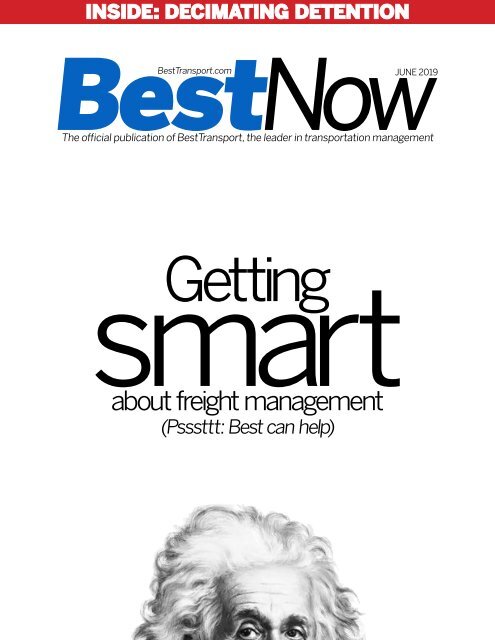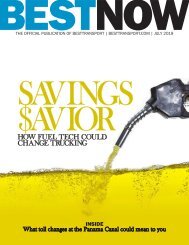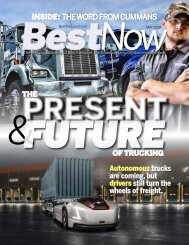BestNow
The official publication of BestTransport
The official publication of BestTransport
- No tags were found...
Create successful ePaper yourself
Turn your PDF publications into a flip-book with our unique Google optimized e-Paper software.
INSIDE: DECIMATING DETENTION<br />
<strong>BestNow</strong><br />
The official publication of BestTransport, the leader in transportation management<br />
BestTransport.com<br />
JUNE 2019<br />
Getting<br />
smart<br />
about freight management<br />
(Psssttt: Best can help)
PORT OF ENTRY ASK REO: SMART ON DETENTION<br />
Clean up<br />
the d-word<br />
In the history of transportation,<br />
one of the old plagues has<br />
been detention of equipment<br />
and drivers. It’s a big problem.<br />
A recent FreightWaves study<br />
provides insight. At its peak, the<br />
average load paid $2.03 per mile.<br />
A driver traveling 550 miles a day<br />
would generate $1,116.60 a day<br />
and $5,582.50 in revenue over<br />
five days. Drivers get an average<br />
of 3.73 loads a week. That leaves<br />
a deficit of 1.27 loads a week per<br />
driver. That calcuates to 698.5<br />
miles lost. At $2.03 a mile, that<br />
adds up to $1,417 in lost weekly<br />
revenue, or $73,684 a year.<br />
So what does all that mean?<br />
Well, it means that if you can<br />
figure out why you’re losing haul<br />
time, you can increase revenue.<br />
It could be that detention<br />
caused by delays at docks loading<br />
or unloading is a big problem. I<br />
believe each of us understands<br />
this could be an issue. BestTransport<br />
co-founder Vince Ciroli<br />
knew it years ago. That’s why he<br />
came up with the Freight Friendly<br />
Initiative.<br />
Here’s a CliffsNotes explanation<br />
of FFI: It suggests that caring<br />
for the well-being of a driver<br />
could mean carriers will review<br />
CLICK HERE OR ON HIS NAME TO EMAIL REO HATFIELD<br />
rates per mile or savings in<br />
detention costs. What does caring<br />
for the well-being of drivers<br />
mean? How about:<br />
• Having the comforts of the<br />
driver in consideration, including<br />
• the timing of the driver loading<br />
and unloading<br />
• the ability of the driver to<br />
have a dock<br />
• the ability to provide a place<br />
for parking<br />
• the ability to share some coffee,<br />
drinks, snacks and restrooms<br />
• the proper scheduling of<br />
loading and unloading and a<br />
place to wait.<br />
Then, just maybe, if we are a<br />
team, this will net savings.<br />
If we increase capacity through<br />
better performance and fewer<br />
delays, if we manage properly<br />
the pickup and delivery schedules<br />
and we offer the services I<br />
just described, then we become<br />
a friendly destination or starting<br />
location.<br />
Today, with electronic logging<br />
devices, or ELDs, in trucks,<br />
dispatchers can determine the<br />
availability of rigs at given times.<br />
Best’s Transportation Management<br />
System allows for scheduling,<br />
dock locations, advanced<br />
knowledge of truck arrivals and a<br />
lot more that add up to savings.<br />
We are taking data and using it<br />
to improve efficiency.<br />
Detention charges filed by carriers<br />
are not cheap. Some have<br />
two hours’ free time for detention<br />
and then charge $30 on the low<br />
end to $100 per hour on the top<br />
end. They also have set limits of<br />
$600 per one detention.<br />
If you follow the FFI of Best-<br />
Transport, you might find your<br />
true detention at the lower end of<br />
the cost.<br />
A concern is this: We want all<br />
parties to be fair. We have found<br />
that what was a fuel surcharge<br />
to replace costs for higher fuel<br />
has turned into a profit center<br />
for some. The improvement of<br />
miles per gallon on trucks has<br />
lost its way in the fuel surcharge<br />
and needs to be discussed in<br />
contracts. The average mph on<br />
trucks has changed from 5.1 to<br />
7.1 mpg or greater. At this level,<br />
carriers save more than $21,000<br />
a year on fuel alone.<br />
In fairness, the cost for trucks<br />
have gone up as well. Detention<br />
is a way to assist carriers with<br />
cost. It is also a cost creating an<br />
incentive to shippers to control<br />
docks.<br />
Nobody can prevent some<br />
delays due to manufacturing,<br />
product or quality issues, but<br />
all of us can use our systems to<br />
schedule better.<br />
Carriers need to be at the<br />
docks on time. Use your system<br />
to track and the dashboard on<br />
the Best TMS to keep records<br />
of failures by carriers as well as<br />
shippers.<br />
Carriers normally deliver in<br />
the mornings and pick up in the<br />
late mornings and afternoons.<br />
Consignees who ignore the unloading<br />
cause harm to not only<br />
the carriers but the shippers who<br />
are dependent on the proper<br />
appointment schedules. Carriers<br />
that fail to be on time in the<br />
morning need to be addressed as<br />
well.<br />
Detention is costly to all. It<br />
needs to be fair to all. You need<br />
to negotiate your detention<br />
up front, schedule your loads<br />
properly at the dock and use your<br />
TMS dashboards to score carriers’<br />
performance and yours.<br />
Detention is not to be a profit<br />
center. Failure to monitor, no<br />
tracking, not holding each<br />
other accountable and schedule<br />
failures turn a cost into a profit<br />
center for those that don’t manage<br />
drivers properly.<br />
I consulted Darlene Boeck,<br />
traffic manager at Corey Steel<br />
Company in Cicero, Illinois, for<br />
her thoughts. Here’s what she<br />
said:<br />
“My approach (only mine<br />
for now it appears) is to reset<br />
the fuel surcharge scale so that<br />
it accurately reflects what it<br />
was originally intended for: To<br />
compensate drivers when fuel<br />
is at a premium. I think many<br />
carriers, as you stated, use the<br />
surcharge to offset detention or<br />
other peripheral charges, but,<br />
unfortunately, EVERY shipper<br />
or receiver gets hit with the same<br />
bat, regardless of whether they<br />
are a detention offender or not.<br />
I think carriers and shippers<br />
should bite the bullet, charge a<br />
real-cost line haul charge, reduce<br />
the fuel surcharge and bill the<br />
appropriate shipper or receiver<br />
when detention does occur.<br />
This would be a paradigm shift<br />
for all carrier and shippers if it<br />
were considered, but it would<br />
reward those folks who work to<br />
keep their docks efficient and<br />
place the burden of detention on<br />
those who struggle.”<br />
Reo B. Hatfield is chief operating<br />
executive of BestTransport.<br />
Email him at rbhatfield@besttransport.com.<br />
2 best now<br />
june 2019 3
MAIN FRAME<br />
4 best now<br />
$mart<br />
money<br />
is on smart<br />
technology<br />
But it takes far more than<br />
gadgetry to deliver results<br />
in the profit column. That’s<br />
where best comes in.<br />
Volvo is an industry leader in smart technology for all types of trucks.<br />
“Nobody give me trouble ‘cause<br />
they know I got it made. I’m bad,<br />
I’m nationwide.”<br />
— ZZ Top<br />
Jimmy carter occupied<br />
the Oval Office,<br />
the Pittsburgh<br />
Pirates were world<br />
champs and global<br />
trade largely was<br />
the province of international<br />
conglomerates when<br />
ZZ Top released its hit single “I’m<br />
bad, I’m Nationwide” in 1979.<br />
That year also marked the passage<br />
of the Trade Agreements Act,<br />
its objectives including, among<br />
other things: fostering the growth<br />
and maintenance of an open<br />
world trading system.<br />
Four decades later, players of<br />
all types and sizes compete in the<br />
global market, so much so across<br />
many industries that the ability to<br />
operate worldwide — never mind<br />
nationwide — is a prerequisite. In<br />
those instances, those who can’t<br />
go global can’t go at all. The world<br />
has grown smaller.<br />
Technology has made it all possible,<br />
opening avenues that only<br />
could have been imagined when<br />
a peanut farmer from Georgia<br />
roamed the White House halls.<br />
Supermax ships, containers and<br />
cargo aircraft all have become<br />
ubiquitous. But more importantly,<br />
the internet has taken over<br />
— the web is worldwide — and<br />
an e-commerce marketplace has<br />
emerged.<br />
That has swept in the burgeoning<br />
era of the Internet of Things<br />
and artificial intelligence, which,<br />
in turn, will bring about a future<br />
in which autonomous rigs rumble<br />
down the highways.<br />
Leaders in freight are scrambling<br />
to modernize and take advantage<br />
of technology’s potential<br />
to improve efficiency, cut cost and<br />
enhance quality.<br />
But challenges have multiplied<br />
with the opportunity.<br />
In the disco-crazed days of ‘79,<br />
global dealings took place in the<br />
long shadows of the Cold War between<br />
the United States and Soviet<br />
Union. Today, tensions are<br />
running high everywhere, not the<br />
least of which between three per-<br />
Continued on next page<br />
By the numbers<br />
The American Association<br />
of Importers and Exporters<br />
last year surveyed companies<br />
to learn how they are using<br />
technology to address global<br />
trade woes. Some of the findings:<br />
Risk fears<br />
What are the top risks facing<br />
supply chain managers?<br />
34%<br />
Regulatory<br />
42%<br />
Supplier and transportation<br />
Top objectives<br />
What are your business<br />
goals?<br />
Reduce costs 57%<br />
Increase customer<br />
satisfaction 46%<br />
ID auto. technology 30%<br />
Build relationships 14%<br />
june 2019 5
petual foes, the U.S., Russia and<br />
China. Perhaps never in history<br />
has commerce confronted such<br />
a confluence of events, from the<br />
tension over tariffs and sanctions<br />
to the rapid advance of technology,<br />
partly fueled by customer demands<br />
reaching their zenith.<br />
Coursing through all this is the<br />
unfolding digital transformation,<br />
with smart technology capable of<br />
tracking, monitoring and correcting<br />
everything from room temperature<br />
to freight’s precise location<br />
at any point in time.<br />
“These problems exacerbate<br />
typical risks and uncertainties associated<br />
with cross-border trade,”<br />
according to an American Association<br />
of Exporters and Importers<br />
(AEI) white paper titled “How<br />
Are Companies Using Technology<br />
to Address Global Trade Woes?”<br />
Smart companies are investing<br />
in smart technology. But like everything<br />
else in the modern era,<br />
merely investing isn’t enough.<br />
“The best-performing companies,”<br />
according to AEI, “are<br />
employing complementary technologies<br />
that allow them to gain<br />
granular visibility and increase<br />
agility.”<br />
Translation: Technology is only<br />
part of a larger picture that must<br />
be considered with care in order<br />
to ensure a smart investment.<br />
Enter BestTransport. Relying<br />
on Best’s Professional Services<br />
Group can help companies put<br />
together a comprehensive strategy<br />
that delivers real bottom-line<br />
results.<br />
“Technology is a wonderful<br />
tool,” said Best Chief Operating<br />
Executive Reo B. Hatfield. “But<br />
it’s only part of the equation.<br />
You can’t expect technology to<br />
do it all. You need to match it to<br />
what you’re trying to accomplish.<br />
That’s where we can help.”<br />
The first step is identifying<br />
goals, Hatfield explained. That<br />
provides the framework for formulating<br />
a strategy with technology<br />
as a linchpin. Best is ready to<br />
help make it happen.<br />
6 best now<br />
J. Scott Cummans<br />
President and CEO<br />
Reo B. Hatfield<br />
chief operating executive<br />
1103 SCHROCK ROAD, SUITE 100, Columbus, OH 43229 | (614) 888-2378 | BestTransport.com













